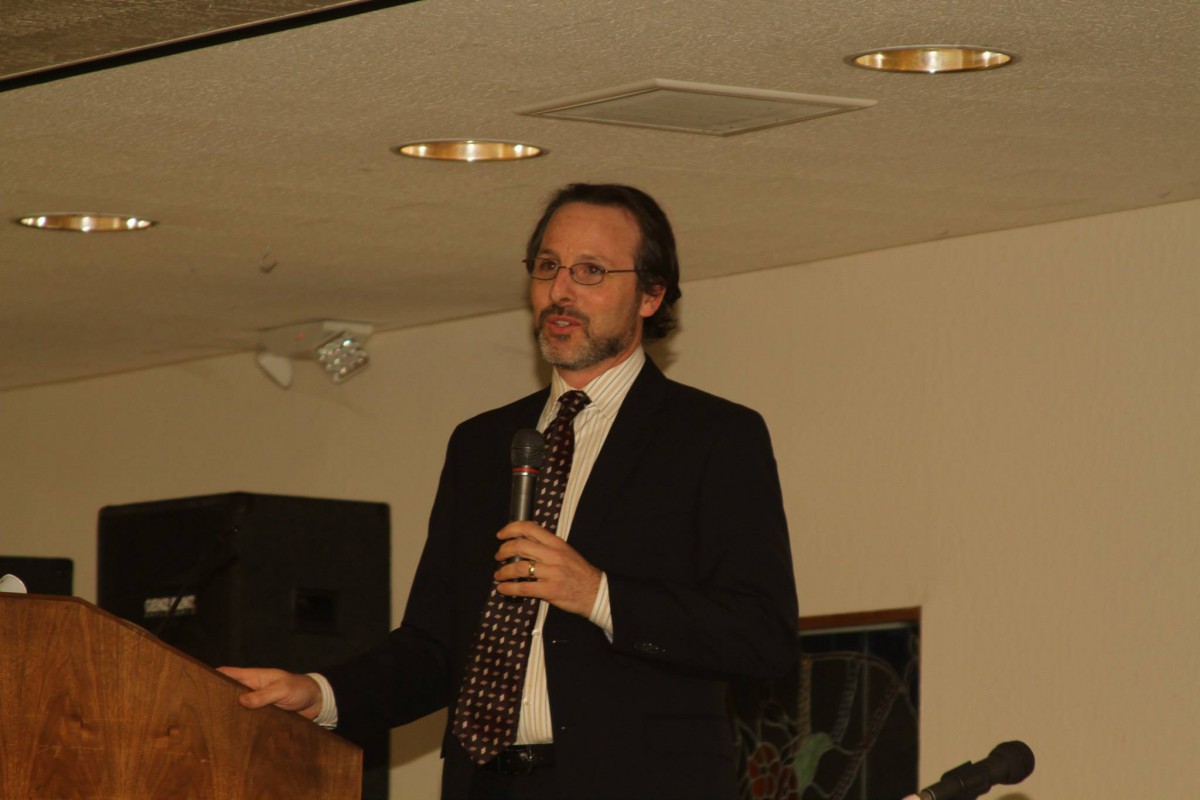
In 2014, Orange County Deputy Public Defender Scott Sanders came to Davis to discuss a case he had been dealing with that was about to become a national story. In a death penalty case where the defendant had already admitted guilt in the guilt phase, the Orange County Sheriff’s Department used jailhouse informants to extract additional information from Scott Dekraai and other inmates and then neither the sheriff’s office nor the OC DA’s office disclosed this material to the defense.
Mr. Dekraai pleaded guilty in 2014 to killing eight people in a shooting at a hair salon in Seal Beach in 2011. His attorney, Mr. Sanders, has attempted to get the state to remove the death penalty.
Orange County Superior Court Judge Thomas Goethals, while originally downgrading the intent of the sheriff’s deputies, determined that they either lied or withheld the truth when they failed to disclose their system and web of jailhouse informants in jails.
The misconduct was so egregious that he removed the OCDA’s office from the penalty phase of the case and assigned it to the Attorney General’s office. The AG’s office appealed, but, by a 3-0 vote, the 4th District panel ruled unanimously to uphold the decision.
While observers were not surprised by the verdict – they told the Vanguard they were caught off caught by the strength of the ruling.
Judge Goethals’ lengthy eight-page, single-spaced order concluded that the DA’s office had a conflict of interest with the sheriff’s office “that prevented the OCDA from fairly prosecuting the penalty phase.” The AG put blame on the sheriff’s department for the misconduct and argued that the DA did not have a conflict of interest.
The appellate court concluded that “it was well within the court’s discretion to recuse the entire OCDA’s office from prosecuting the penalty phase because the OCDA had a disqualifying conflict of interest.”
The three-judge panel called the argument made by the AG’s office, “The trial court’s order recusing the OCDA from prosecuting Dekraai’s penalty phase trial was a remedy in search of a conflict,” “Nonsense” (emphasis in the original).
Writes the panel, “The court recused the OCDA only after lengthy evidentiary hearings where it heard a steady stream of evidence regarding improper conduct by the prosecution team. To suggest the trial judge prejudged the case is reckless and grossly unfair. These proceedings were a search for the truth.”
The court notes that deputy sheriffs “placed CIs [confidential informants] near represented defendants, including Dekraai, to obtain statements, and prosecutors were aware of the CI program and either explicitly or implicitly promised CIs they would receive a benefit. There was also evidence that after DAs met with a CI and learned the CI questioned Dekraai, DAs obtained permission from OCSD to place a recording device in Dekraai’s cell to obtain additional statements. OCDA prosecutors and investigators also testified their discovery practices concerning the CI program were deficient in this case and others.”
However, the trial court denied the motion to dismiss the death penalty. “The court reasoned that although the prosecution team committed significant, negligent misconduct in this case as evidenced by the OCDA’s constitutional discovery violations and interference with Dekraai’s constitutional right to counsel, evidence concerning prosecutorial misconduct in other cases was not relevant in this case.”
The judge here found the misconduct to be “negligent and not malicious.” More importantly, “The court concluded that when considered in its totality, the prosecutorial misconduct did not constitute outrageous government conduct requiring dismissal of the special circumstance Dekraai already admitted or the death penalty.”
Despite the court’s finding “it concluded a significant sanction was appropriate and prohibited prosecutors from using Dekraai‟s custodial statements during the penalty trial.”
At a second evidentiary hearing, “Two OCSD deputy sheriffs who testified at the first evidentiary hearing admitted they did not disclose the TRED [the computer tracking system of inmates] records and gave conflicting reasons for the failure.”
At the conclusion of the second evidentiary hearing, “the trial court explained that for a decade OCSD maintained the TRED database where it documented inmate housing movements and deputy sheriffs accessed the database on a daily basis. The court opined the two OCSD deputy sheriffs were not credible and concluded evidence concerning prosecutorial misconduct in other cases was now relevant in this case. The court reasoned that although there was no evidence the OCDA knew of or concealed the TRED records, their recent disclosure demonstrated the OCDA’s ‘benign neglect’ resulted in a violation of Dekraai’s constitutional and statutory rights.”
The court concluded that the trial court did not abuse its discretion by recusing the DA’s office from prosecuting the penalty phase. The court found substantial evidence to support the court’s conclusion that there is an institutional relationship that “constituted a conflict of interest that prevented the OCDA from fairly prosecuting the penalty phase.”
That relationship prevented “it from supervising its law enforcement team” moreover, the court found that record suggested “the OCDA‟s conflict of interest was so grave that it was unlikely Dekraai would receive a fair penalty phase, was within the permissible range of options provided by section 1424.”
The trial court explained that “it was debatable whether the supplemental evidence demonstrated the prosecution team engaged in outrageous government conduct.”
The court said what was clear was that there were “serious, ongoing discovery violations” that required imposition of additional sanctions. But it found that “there was no evidence the OCDA knew of the TRED system until after the first hearing but that was not dispositive because for Brady purposes the DA had constructive knowledge of all information possessed by the prosecution team.”
The Attorney General makes the claim in her briefs that “all the fault lies with the OCSD, and the OCDA is not to blame for the custodial CI program OCSD operated in the OC jails.”
The court argued that “the recusable conflict of interest, a divided loyalty, is based on the OCDA‟s intentional or negligent participation in a covert CI program to obtain statements from represented defendants in violation of their constitutional rights, and to withhold that information from those defendants in violation of their constitutional and statutory rights. The conflict here is ‘real,’ it is ‘grave,’ and goes well beyond simply ‘distasteful, or improper’ prosecutorial actions.”
Therefore, the court found that the trial court’s recusal of the DA’s office “was a necessary step to ensure Dekraai’s personal right to a fair penalty trial.”
“The magnitude of the systemic problems cannot be overlooked,” the court continued. “Wagner, a 20-year veteran of the OCDA and supervisor of the homicide unit, admitted his legal reasoning on a prosecutor’s fundamental ethical obligations under Massiah was flawed. Simmons, a 24-year veteran of the office, explained his understanding of his ethical obligation was ‘evolving.’”
The court concluded, “This record does not support a finding there was a reasonable basis for the trial court to have confidence the OCDA will prevent future misconduct from occurring in this case.”
The court, responding to arguments from the AG, wrote, “The record before us demonstrates that from the outset, the OCDA failed in its duty as the primary county prosecutor to supervise its prosecution team, specifically the OCSD, and ensure its prosecutors and its law enforcement team complied with its constitutional and statutory obligations.”
They found that the “familiarity and cozy” relationship between the two agencies “contributed to the problem.”
The court concluded, “The OCDA’s primary function is to prosecute crimes in Orange County. In that capacity, it must exercise its vast discretion justly and fairly to ensure every defendant is treated fairly, regardless of the severity of the charged offenses. Here, the evidence demonstrated the OCDA had an interest extraneous to its official duties—its loyalty to the OCSD and its desire to protect the OCSD at the expense of Dekraai’s constitutional and statutory rights. This abdication of the OCDA’s fiduciary duty violated Dekraai’s due process rights.”
–David M. Greenwald reporting






wow, the appellate court really let everyone have it. the problem i have is there is always a conflict of interest between the da and law enforcement. no one seems to recognize it. and shame on kamala, there is a reason why a lot of libs didn’t vote for her.
David — Would it be possible for you to post the full trial court order and/or the appellate opinion — or a link to same — when reporting on significant cases like this?
http://www.courts.ca.gov/opinions/documents/G051696.PDF
Thank you… have read dozens of these over the years (although not usually in criminal matters), and most are enlightening as to logic, etc.
Suggest when you do an article like this, you (David) include these type of cites… will tend to increase credibility, methinks…
But reiterate my thanks for doing so now…